

Sprinkle a little ancient philosophy into your daily routines. Axial Age. Pivotal age characterizing history and philosophy from the 8th to 3rd centuries BCE Axial Age (also Axis Age,[1] from German: Achsenzeit) is a term coined by German philosopher Karl Jaspers in the sense of a "pivotal age", characterizing the period of ancient history from about the 8th to the 3rd century BCE.

During this period, according to Jaspers' concept, new ways of thinking appeared in Persia, India, China and the Greco-Roman world in religion and philosophy, in a striking parallel development, without any obvious direct cultural contact between all of the participating Eurasian cultures. Jaspers identified key thinkers from this age who had a profound influence on future philosophies and religions, and identified characteristics common to each area from which those thinkers emerged. Many have questioned whether the 'axial age' is a legitimate category of history. Definition[edit] Characteristics[edit] Jaspers presented his first outline of the Axial age by a series of examples:
Remembering More of Everything: The Memory Palace. “When information goes ‘in one ear and out the other,’ it’s often because it doesn’t have anything to stick to.”— Joshua Foer That’s a quote from the book Moonwalking with Einstein, the fascinating account of Joshua Foer’s journey investigating memory.
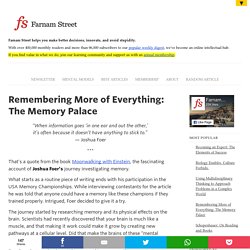
What starts as a routine piece of writing ends with his participation in the USA Memory Championships. While interviewing contestants for the article he was told that anyone could have a memory like these champions if they trained properly. Intrigued, Foer decided to give it a try. The journey started by researching memory and its physical effects on the brain. Read to Lead: How to Digest Books Above Your “Level”
The Top 3 Most Effective Ways to Take Notes While Reading. Before you get started: Filter the book by reading the preface, index, table of contents, and inside jacket.
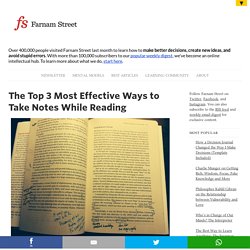
This tells you where the author is going to take you and, importantly, the vocabulary they will use. There are three steps to effectively taking notes while reading: Mentally Owning a Book – The Mission – Medium. Reading is one of the key ways we learn new things.
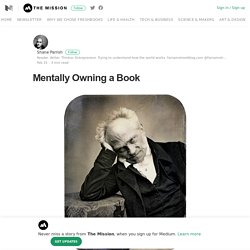
And while it’s easy to pick a book up and turn the pages, it’s harder to actually understand and apply the lessons. How to Remember What You Read. “I cannot remember the books I have read any more than the meals I have eaten; even so, they have made me.” — Ralph Waldo Emerson Why is it that some people seem to be able to read a book once and remember every detail of it for life, while others struggle to recall even the title a few days after putting down a book? The answer is simple but not easy. The High five Notebook. Mark Page Line Edges to Organize Your Paper Notebook. What's the best, most effective way to take notes? If it feels like you forget new information almost as quickly as you hear it, even if you write it down, that’s because we tend to lose almost 40% of new information within the first 24 hours of first reading or hearing it.
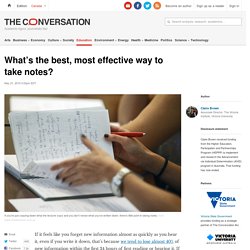
If we take notes effectively, however, we can retain and retrieve almost 100% of the information we receive. Learning how to retain information The most effective note-taking skills involve active rather than passive learning. The Science of Learning. <p>Unable to play video. Please enable JavaScript or consider upgrading your browser. </p> Captions Settings Dialog Beginning of dialog window. Escape will cancel and close the window. Universal Basic Income Is Silicon Valley’s Latest Scam. Uber’s business plan, like that of so many other digital unicorns, is based on extracting all the value from the markets it enters.
This ultimately means squeezing employees, customers, and suppliers alike in the name of continued growth. When people eventually become too poor to continue working as drivers or paying for rides, UBI supplies the required cash infusion for the business to keep operating. Graduate Certificate in Digital Education. The Science of Learning. Unit of Study. Learning for Free. What’s the best way to organize my research? Religions - Christianity: The Trinity. Modern Money Mechanics. Introduction to Project Management. Project management is an essential skill-set for many careers and in many contexts in our lives.

Introduction to Project Management is an ideal starting point if you need to manage projects at work or at home, while not necessarily being a formally trained project manager. It is also suitable if you are considering undertaking a project in the near future and are seeking to learn and apply essential project management knowledge and skills. The 37 Best Websites To Learn Something New — Life Learning. Forget overpriced schools, long days in a crowded classroom, and pitifully poor results.

These websites and apps cover myriads of science, art, and technology topics. They will teach you practically anything, from making hummus to building apps in node.js, most of them for free. There is absolutely no excuse for you not to master a new skill, expand your knowledge, or eventually boost your career. The 12 Common Archetypes. The 12 Common Archetypes By Carl Golden The term "archetype" has its origins in ancient Greek.
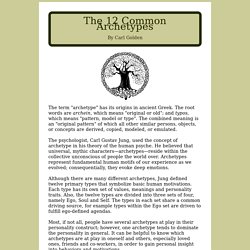
The root words are archein, which means "original or old"; and typos, which means "pattern, model or type". The combined meaning is an "original pattern" of which all other similar persons, objects, or concepts are derived, copied, modeled, or emulated.